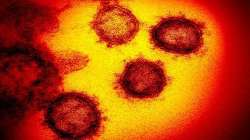Scientists identify molecules that may block key COVID-19 drug target
Researchers have identified a library of molecules that can potentially shut down a protein involved in the novel coronavirus genome replication process, an advance that may lead to the development of new therapeutics for COVID-19.

Researchers have identified a library of molecules that can potentially shut down a protein involved in the novel coronavirus genome replication process, an advance that may lead to the development of new therapeutics for COVID-19. According to the scientists, including those from Columbia University in the US, the novel coronavirus, SARS-CoV-2, uses a protein called polymerase to replicate its genome inside infected human cells.
They said terminating the polymerase reaction will stop the growth of the coronavirus, leading to its eradication by the human host's immune system.
The study, published in the journal Antiviral Research, describes the potential of several molecules to block the polymerase reaction, establishing them as potential lead compounds that can be modified for developing COVID-19 drugs.
Five of these molecules are already approved for use in the treatment of other viral infections including HIV/AIDS, and hepatitis B, the scientists said.
In an earlier set of experiments testing the properties of the polymerase of the SARS-CoV behind the 2002-03 pandemic, the scientists found that the molecule triphosphate of sofosbuvir was able to terminate the virus polymerase reaction.
They demonstrated that sofosbuvir and four other analogous molecules also inhibited the SARS-CoV-2 polymerase with different levels of efficiency.
From these experiments, the team devised a strategy to select 11 similar molecules with a variety of structural and chemical features as potential inhibitors of the polymerases of SARS-CoV and SARS-CoV-2.
According to the researchers, six of these 11 molecules exhibited immediate termination of the polymerase reaction, two showed delayed termination, and three did not terminate the polymerase reaction.
The scientists believe that once the potency of these drugs to inhibit viral replication in lab-cultured cells is demonstrated, the candidate molecules and their modified forms may be evaluated for the development of potential COVID-19 therapies.
"We are very hopeful that the structural and chemical features of the molecules we identified, in correlation with their inhibitory activity to the SARS-CoV-2 polymerase, can be used as a guide to design and synthesise new compounds for the development of COVID-19 therapeutics," said Jingyue Ju, study co-author from Columbia University.